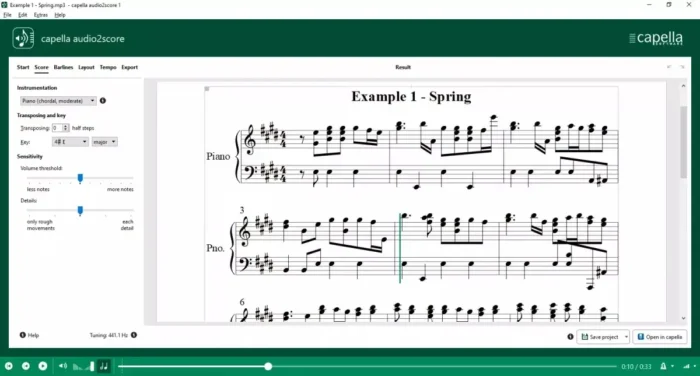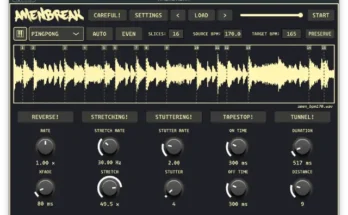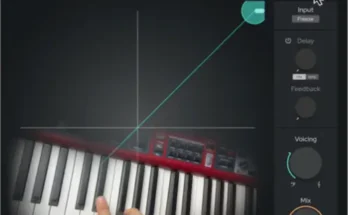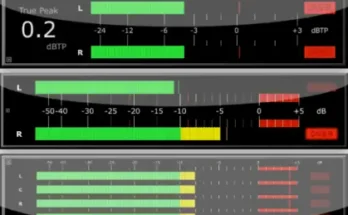Audio2score Pro v5.0
P2P | 08 November 2024 | 516 MB
capella audio2score analyzes your recording, e.g. an MP3 file. The recognized notes are examined, sorted and then sensibly poured into a new arrangement. This can be done for piano or for a quartet, for example – it’s your choice.
capella audio2score pro does not show you an exact transcript of the original. Please imagine the result more like a piano reduction or a particell (depending on your settings). Export to Midi, capella or MusicXML format as well as PDF.
Feature list
•Note by note recognition
•AI-assisted note recognition
•Distinction of three timbres: 1. winds, 2. strings, 3. piano
•Optimized mode for solo piano
•Recognition can be combined with the recognition of a singing voice
•Suitable for pieces without vocals (stereo suppression of vocals and sole recognition of accompaniment possible, depending on recording)
•Recognition of polyphonic sounds of any instrumental recordings (except percussion)
•Automatic arrangement of the recognized notes for various ensembles (selectable: piano, string quartet, wind quintet, guitar, monophonic, etc.); independent of the original
•Intelligent distribution of notes to voices (no fixed split points, but formation of lines)
•Specification of different levels of difficulty for piano arrangements; Level of detail slider
Harmony detection
Harmony symbols
Holistic recognition
•Suitable for pieces without or with vocals
•Recognition of the melody (instrumental and/or vocal; with differentiation)
•Bass line detection
•Realization of accompanying voices based on the harmonies
•Predefined ensembles selectable (piano, orchestra, band, …)
•Robust, well playable result even with complex pieces
Further recognition
•Recognition of barlines (can be corrected if desired)
•Key detection (can be corrected if desired)
•Tuning detection (concert pitch a’)
•Automatic local derivation of enharmonic changes (“F sharp” or “G flat”?) according to the harmonic context
•Free configurability: set up any desired ensembles with individual voices, recognition settings, quantization and accompaniment patterns
•Combination of note-by-note and holistic recognition; creation of templates for new projects
•Notes can be transposed if desired
•Support of transposing instruments
Editing
•Support from the sound tissue, which provides visual insight into the sound
•Display of tones as tone boxes (piano roll view) and as note images
•Intuitive editing in both views, real-time synchronization
•Post-processing of harmonies (accompanying voices adapt)
•Barlines and beat strokes: changeable by manually setting marks
•Barlines: changeable by tapping along with playback
•Adjustable formatting of the notes (page size, bar numbers, …) partly
Voice editor for the score layout of all voices (clefs, line spacing, solid barlines, etc.)
Operation
•All settings with visual and acoustic preview in real time
•Qualitative playback of recognized notes via soundfont (capella-tune)
•Control listening of the result by simultaneous playback of the original (mixer function), at any tempo (time stretching)
•Mouse mode: playback of original and/or recognition by mouse swipe at any tempo
•Voice filtering for tones boxes and playback
•Modern MDI interface in which multiple documents / views can be placed side by side
•Easy-to-use, limited wizard interface for getting started
•Switch to the main program (complete features) and back possible at any time
•Direct transfer of the notes to capella
•Help notes in the program and detailed documentation
Please REPORT Broken Links in the Comment




